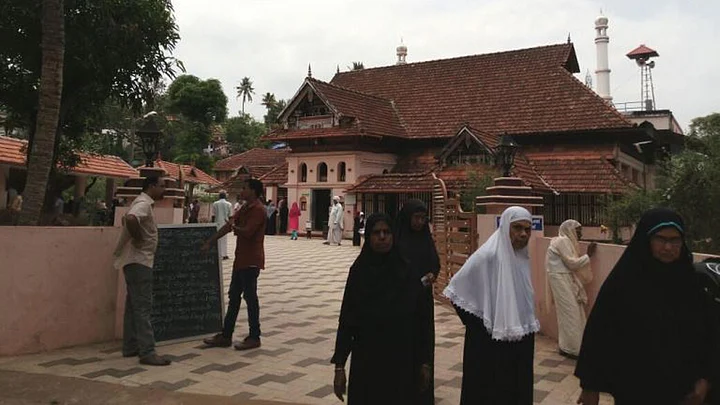For Seema Razaq, the visit to a 1000-odd-year-old mosque, that had been a male bastion all these years, was an especially memorable one. She had, as did other women, a small role to play in making it happen.
A resident of Thazhathangady in Kottayam district, Seema had for long, harboured the desire to visit the Juma Masjid, believed to be one of the oldest Sunni mosques in India. Situated on the banks of the Meenachil river - one of Kerala’s Heritage Zones – the mosque is famous for its unique pillars, arches, teak pediments and intricate Arab-style carvings.
When the masjid’s committee threw open the doors of the mosque for women to visit, it was because of the amorphous but continual pressure exerted on the committee by various women, often independent of each other.
Seema says that the idea to demand entry for women into this particular mosque germinated during one of the many ayalkootams – informal neighbourhood meetings – of women over a year ago. Many of these women had contacts with the mosque committee members and began raising the issue around a year ago.
“When we first started making the request, they weren’t open to the idea. Now, finally they’ve decided to give permission. I hope they let us continue to visit,” Seema says.
The mosque committee allowed women to visit the mosque on two days – Sunday and May 8 during the intervals between prayer times. On Sunday women were allowed to enter the mosque between 8am to 12pm, 1pm to 3:30pm and finally from 4:30 to 6pm.
Foreigners come here often but women of our own locality have never been inside. Taking into consideration their long-standing request to be able to enter the mosque, the committee decided to grant them permission on Sunday as well as on May 8.Masjid Mahallu Committee secretary Yusuf M told The News Minute
- Only Visit, Not Pray?
- However, this isn’t a whole-heartedly benevolent or magnanimous gesture.
- There restrictions on timings of the visit.
- A prescribed dress code is to be followed.
- Only ‘properly-dressed’, non-menstruating Muslim women could enter.
- And till the time they exit the place, they should have only Allah on their minds.
- It also mentioned that this should not be construed as worship or celebration but a mere visit.
Despite this, practically everyone whom The News Minute spoke to, welcomed this step. But many of the women also wanted to pray inside the mosque.
This is the first time I have entered a mosque. I just cannot express my happiness. I would love to come here regularly to offer Namaaz but that’s just not possible, right.Saudha Hasssan, a 60-year old who stays right next to the mosque.
However, faced with women like Saudha, some of the committee members did allow the women to offer prayers in a smaller hall off the main prayer hall.
Sixty-five-year-old Ayishumma, who came all the way from Malappuram, was ecstatic. Although she came with the expectation of only being permitted a visit to the beautiful mosque, she was allowed to pray.
No part of the mosque was out of bonds for the women, including the main prayer hall. However, they were forbidden from entering that room when the men arrived for namaaz.
There was a noticeable difference in the attitudes of various groups of women. The older women were more accommodating, content with permission to visit if not to offer namaz.
But younger women like 19-year old Fousiya Yusuf, were more assertive. Even though she was appreciative of the current situation, she felt more was needed.
A separate place and a time could be made available for the exclusive use of women inside the mosque. It’s time to change.Fousiya Yusuf
Although the committee has given in to the demands of the women, in accordance with spirit of the times, there appear to be various strands of opinion and shades of comfort and discomfort with the current decision within the committee.
This was evident when men accompanied the women of their families for the visit and entered the mosque together. Some of the men, including committee members, objected to this and separated the men and women. Some of the committee members were also unhappy that women were allowed to pray inside the mosque even thought it had not been formally approved.
The committee has a lot of decisions to make, but while there may be different degrees of assertiveness among them, the women who came to the temple were very happy to be there. And some of them, like Seema and Fousiya, regardless of the different generations that they belong to, firmly believe that women should be allowed into mosques. “They should allow us to pray here,” Seema says.
The ayalkootams are held regularly; perhaps the contours of further action will emerge there.
(This article was published in collaboration with The News Minute.)
